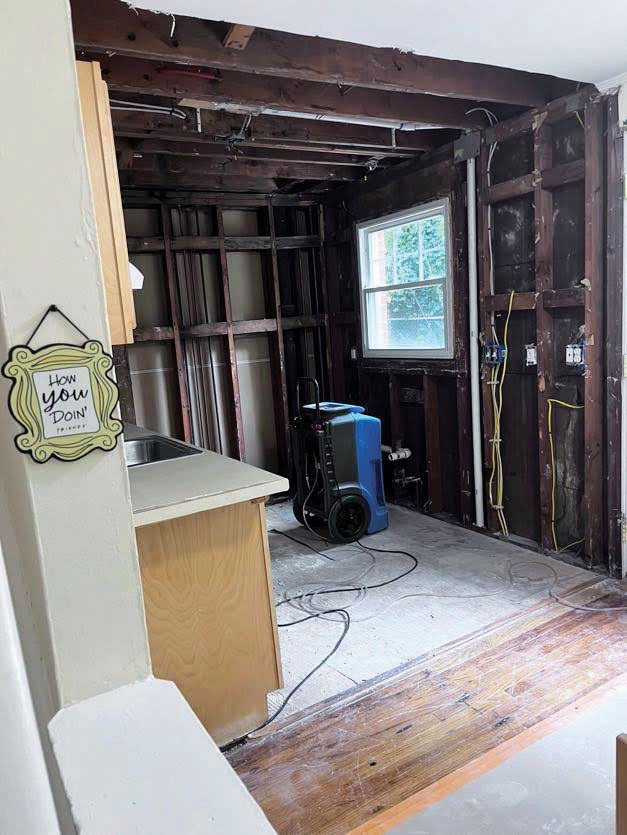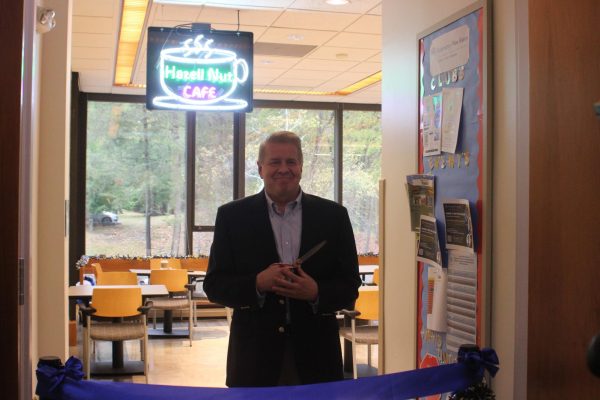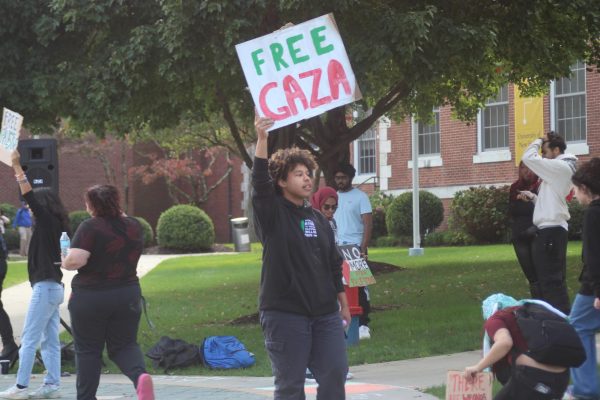Troubles in Savin apartments displaces 3 students
Photo courtesy of Charger Bulletin/Melanie Kirtman.
Inside of the kitchen in the apartment on Savin Ct., mid-construction, West Haven, Oct. 7, 2022.
On the morning of Sunday, Oct. 2, senior Melanie Kirtman woke up in her Savin Ct. apartment to “the ceiling actually raining” from where their bathroom sits above the kitchen. The leak turned into much more as Kirtman and her roommates, seniors Jaden Salazar and Becca Castleman, were shuffled into different housing arrangements and left in the dark about when they would be able to return to their apartment.
Kirtman also said that the floors were hot, which turned out to be an exploded heating coil.
They called the emergency duty line, who dealt with the issue immediately, and within just a couple of hours, the three seniors were evacuated from their apartment and relocated to emergency housing in the first-year residence hall, Gerber Hall, into a room that was previously the Office of Admissions showroom.
However, not long after, they said that they hit a roadblock in information, as the Office of Residential Life (ORL) told them the issue was now in the hands of the property owners of the Savin Ct. apartments.
The three clarified that all interactions with University of New Haven facilities staff and workers were “incredible,” but had concerns surrounding management of the third-party contractor from which the university leases apartments, in addition to the proactiveness of the ORL in resolving this issue.
“I know that they are contracting this out, so this has nothing to do with UNH facilities; they’ve been nothing but nice to us; they’ve been great,” Salazar said.
They said the first thing that the university asked them, over the phone, was “Do you have anywhere else to go?” They were all asked if they were able to go home or stay with someone else.
In terms of accommodations following the relocation, the women didn’t get access to the dining halls until lunchtime on Monday. The meal plan provided three swipes a day which could be used in the Marketplace and FOD, and did not include any dining dollars. They said that “emergency protocol is bare-minimum.”
Area Coordinator Wendy Johns facilitated the group’s access to Westside Hall for kitchen usage, but were not granted access until Thursday, when they received a single key to access the hall to cook. The three repeatedly discussed their very different schedules, meaning it would be difficult to coordinate using the one key amongst the three of them.
Questions from administrators about their former Savin Ct. included “Did you shower or bathe for too long?” which they said made it feel as if the administration “tried to blame us for what happened.”
The group honed in on their experiences with one man who handled the issue in their apartment. The name of the worker was never given to them; Salazar said that “We don’t even know technically who owns [the property] and we were never offered that information either.” They did say that the worker identified himself as “maintenance.”
“He takes our broom or our mop and starts ripping down the ceiling, not telling us he was going to do that,” Castleman said.
“He said ‘no, this is just a small leak, it’s nothing big; it won’t be that bad to fix.’ Because apparently he is known for cutting corners and not doing what he’s supposed to,” Castleman also said. She referenced an occurrence back in 2018, during which a Savin apartment not far from their own was repaired by the group who owns the complex, but was determined by facilities upon a follow-up inspection that damages were still present and the work done by those outside of the university was “unacceptable.”
They described their feelings surrounding the situation as feeling “stressed,” “uncomfortable” and “anxious,” and expressed issues with a drastic change in diet due to their accommodations, and an inability to properly eat or sleep.
On Sunday, they were told that they would be placed back into their housing “Wednesday at the latest.” Their updated timeline as of this past week has them returning to their apartment on Oct. 14, more than two weeks after the leak began.
“Being in emergency housing for three days is one thing, but keeping us in Gerber for two weeks is another,” Salazar said.
Castleman discussed what occurred when the group went back to their apartment to pick up some of their belongings last Monday, Oct. 3.
She said that they waited in her car before going inside, and watched “maintenance” begin cleaning and working on the unit.
“And then he walks up to our unit, notices that he locks himself out of our unit; he then decides to grab our screen from our window, pull it off and open up our window, and unlock the door from the inside,” she said. “And he doesn’t replace the screen afterwards; he just leaves it and then does his business and then later leaves.”
“Even though he locked the door, our apartment was still accessible because he didn’t lock the window again.” They went to check the window inside after he left, and found it still accessible from the outside.
They also said that they were not aware of and did not see anyone else in their apartment other than the one referenced worker during any of their visits.
“We didn’t get to inventory what we had; we didn’t give permission for our items to be touched,” Salazar said. “And so we’re emailing the director [of ORL] about all of this and it was just ‘we’ll talk to them’ and ‘we’ll get back to you.’ For all of Monday, it was ‘we’ll get back to you,’ and it was so incredibly frustrating because we were told we were supposed to be back in by Wednesday.”
Kirkman voiced other concerns, saying that since the leakage only impacted the kitchen and bathroom, they closed off their bedrooms for privacy. She said that when they went back, though, “I went into my bedroom to go get things, and there was evidence that people were in there, in my space. There was stuff on my bed, on my sheets, that I didn’t put there.” Their items from other areas of the apartment were moved into their sleeping quarters.
Upon returning for later visits, more of the bedrooms had items from outside placed into them.
“It’s just a blatant disregard for our belongings,” Salazar said.
Curtis Clark, director of campus life in the ORL, and Tammy Mulrooney, the associate director of residential operations, spoke on the protocol, policy and approach taken to incidents such as the one previously described.
Clark said that when it comes to relocation, whatever rooms are available are where students are placed, ideally with as similar accommodations as the original housing as possible. If any university-sponsored campus housing is available, then they will not be cleared to relocate students to a nearby hotel. “If we have a space on campus that we’re able to use as a temporary space, that’s where students will be placed. In this case, we’re pretty full, occupancy wise, but we happened to have a couple of spaces that we use,” he said.
Rooms are not set aside for these instances prior to housing registration, as they do not want to take any beds from potential residential students.
“All of our spaces remain secured; all of the staff that are in our spaces are obviously either vetted through the university or they’re employees of the university that have to follow our policies,” Clark also said. “With these third party management companies, a lot of times they’re responsible for contracting the work out.” This process is updated through the Office of Facilities.
He also said that although students are highly encouraged to carry renter’s insurance, the university will try its best to reimburse for damaged goods in events like these.
When asked about how they attempt to ensure comfort of students who must be relocated, Clark said that they try to find the most comparable space they can, though honoring this is not always possible. He added that the university is at 98% of the residential capacity.
Clark also described that it is policy for the university to cover the cost of a meal plan during residential relocation if a kitchen space is taken away from students.
Mulrooney spoke on the grounds that emergency housing relocations are for “strictly temporary,” with expected stay up to 72 hours, before “permanent” relocation is established.
They both emphasized that above all, they felt safety and security of students held priority in terms of considerations of relocation.

Mia Adduci is a senior studying communication concentrating in multi-platform journalism and media who began writing for the paper her first semester on...







